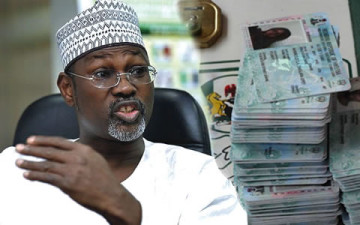Politics
INEC May Jettison Card Readers Use; Jega To Meet With RECs On Wednesday For Crunch Decision

By Chris Nomjov
The Independent National Electoral Commission (INEC), may change its mind on using Smart Card Reader Machines for the forthcoming general elections, findings revealed over the the weekend. A top INEC official said INEC Chairman, Prof. Attahiru Jega’s review of his stance to use the machine for the elections followed preliminary reports from the trial test of the machine, which held in 12 states at the weekend.
According to him, the INEC chairman may take the final decision on the matter at a meeting with resident electoral commissioners (RECs) from the 36 state of the federation and the Federal Capital Territory (FCT), holding on Wednesday in Abuja, to deliberate on the outcome of the mock election.
During the trial test, some glitches were discovered in how the card readers function, giving concerns to stakeholders, some of who faulted INEC’s insistence on using the machine for the elections. It was learnt that Jega was disturbed by the outcome of the mock election conducted by the electoral body to test the efficacy of the card readers.
The source said the ‘preliminary reports were fraught with technical hitches,’ adding that “the coming elections might witness less than 50 per cent participation of registered voters.”
The propriety or otherwise of the use of the machine has been a sore point between the Peoples Democratic Party (PDP) and the All Progressives Congress (APC) with the ruling party championing the campaign to dump the machine. The source said even though the performance of the card readers was not considered a failure, it fell short of the commission’s expectations. He said:
“We have been under intense pressure as to how best to make the card reader technology more fraud-proof and efficient as we prepare for the polls. But from all indications, the preliminary reports received from some field officers are to the effect that a lot still has to be done; not in relation to the efficiency of the machine, but the issue of certain avoidable technical hitches.
“In some areas, it is either that the battery of the machine ran down or how to operate it became an issue; all these we are going to consider at Wednesday’s meeting because it is one issue we must get right. “As far as we are concerned, there can never be trial and error and if these preliminary reports are confirmed to the extent that there are unlikely to be assurances of remediation, we might fall back on non-usage, but as at this time of talking to you now, a decision is yet to be taken on the issue.
“The main reason we need to meet on Wednesday before taking a decision is because if we base our judgement on these early reports, it then means that less than 50 per cent of Nigerians whose eligibility has been confirmed might not vote in the coming elections; one, because of the errors and technical hitches, and two, the time being spent on the operation of the machine per voter.
What this mean is that so many hours will be wasted at the detriment of eligible voters.” INEC had held the fieldtesting of the card reader technology to hold in 225 polling units and 358 voting points across in 12 states of the federation on Saturday. Affected areas were Port Harcourt City (Rivers), Abakaliki (Ebonyi), Ado Ekiti (Ekiti), Gassol (Taraba), Kumbotso (Kano), Bunza (Kebbi), Kokona (Nasarawa), Shiroro (Niger), Ikeja (Lagos), Aguata (Anambra), Oshimili South (Delta) and Jama’are (Bauchi). Reacting to the outcome of the mock election, Ondo State Governor, Dr. Olusegun Mimiko, warned against the use of the card readers for the elections.
He said if the machine developed any fault during any election, it would truncate the electoral process. Also, Ekiti State Governor, Mr. Ayo Fayose, said INEC was only looking for ways to mar the general elections by its insistence on using the machine.
Fayose, in a statement by his Special Assistant on Public Communications, Mr. Lere Olayinka, said he was not against the use of any technology to ensure credible elections, but the flaws recorded during last Saturday’s test of the machine were too fundamental to be ignored. He said: “Unless INEC has an agenda that is different from the conduct of free, fair and credible elections, the use of the card readers should be suspended for future elections so as to enable proper test-running of the technology.”
But the APC State Publicity Secretary, Taiwo Olatubosun, disagreed with Fayose. He said in a statement that the mock election allayed fears of the failure of the machine during accreditation. According to him, the result achieved through the technology marked the end of over-voting and impersonation problems that dented the credibility of the nation’s electoral process.
Describing the time saved during the exercise as incredible, he said card readers eliminated spending long hours in the queue, while also removing the fears of health issues that might arise from staying for long hours in the sun. However, former PDP National Deputy Chairman, Chief Bode George, said the use of the card readers was not full-proof because of the probability of malfunctioning like any other technology.
He told airport reporters in Lagos at the weekend that INEC has to prove to Nigerians that it is ready for hitch-free elections with the use of the card readers. He said millions of Nigerians would have been disenfranchised if INEC had gone ahead with the earlier dates scheduled for the elections without postponement.




